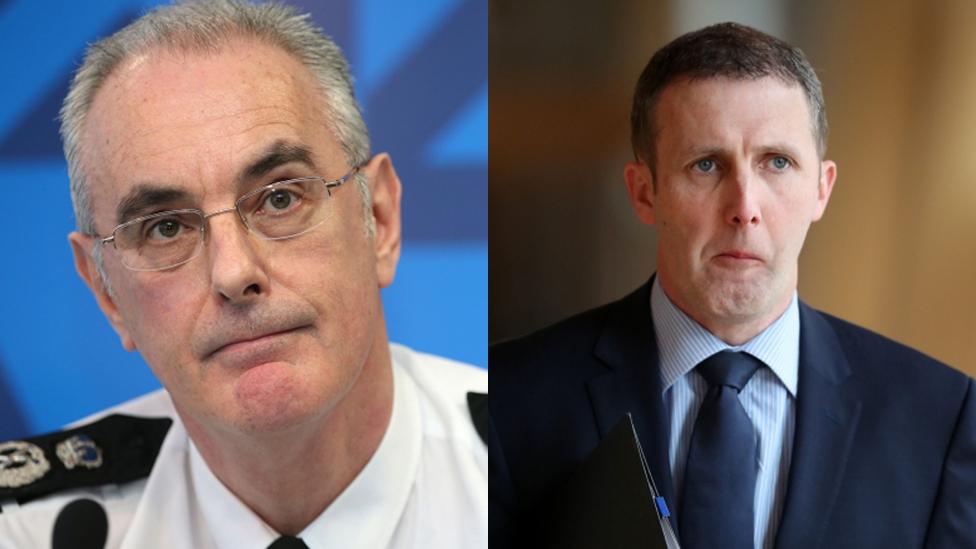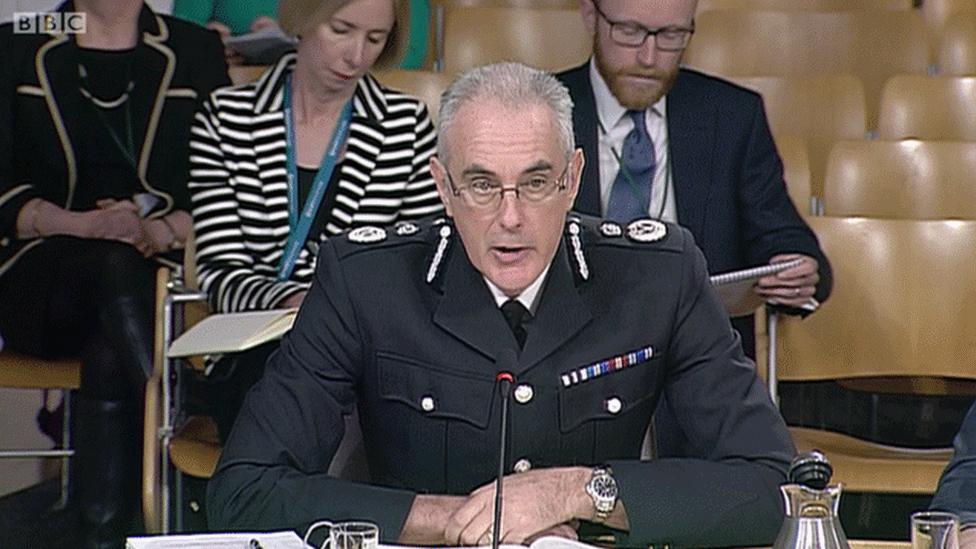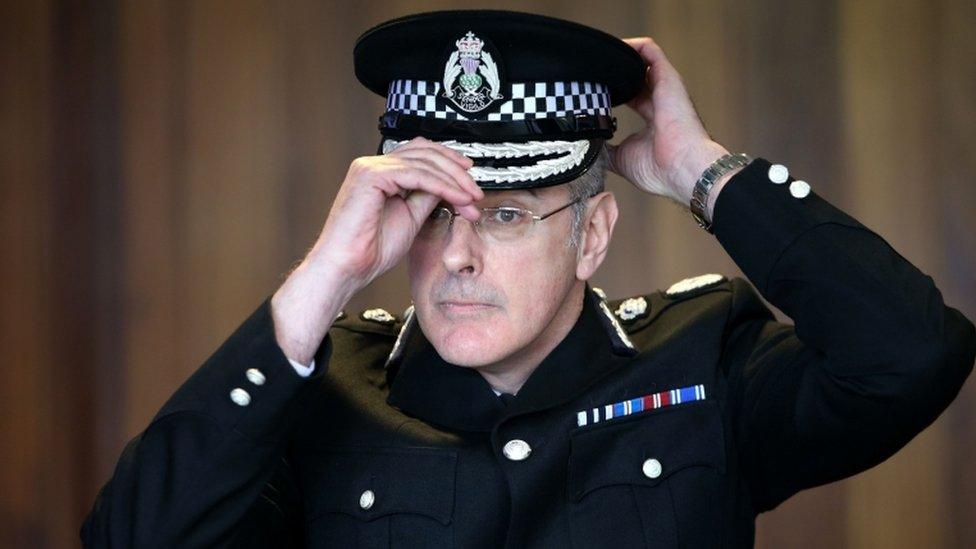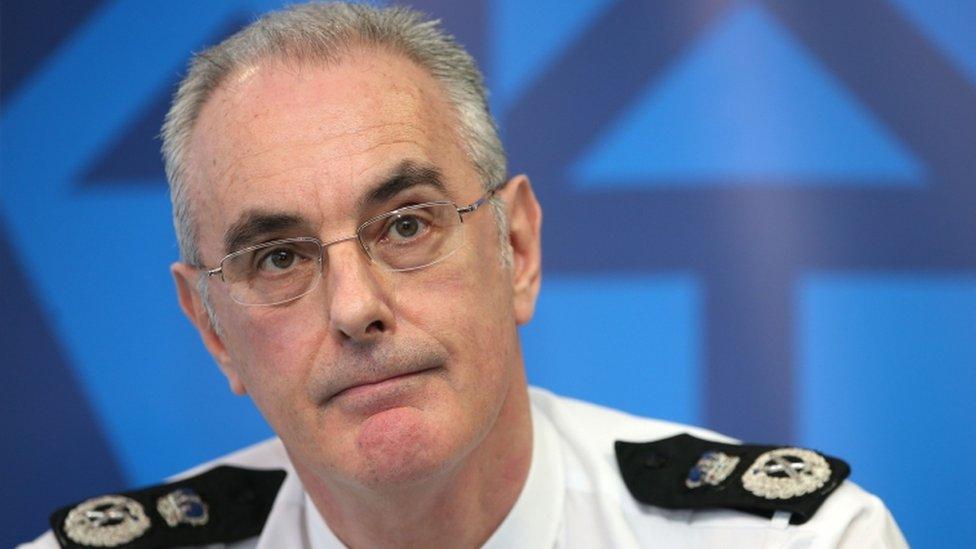Minister accused of 'unlawful' intervention over police chief
- Published

Lawyers for Phil Gormley say Michael Matheson intervened to stop the chief constable coming back to work
The justice secretary is to update MSPs on the future of Police Scotland's chief constable amid claims he illegally blocked his return to work.
Phil Gormley is on special leave while accusations of gross misconduct against him are investigated.
His lawyers say he was signed off to return to work by police chiefs prior to an "intervention" from ministers.
Michael Matheson is to make a formal statement on Mr Gormley's future at Holyrood on Wednesday.
The Scottish government said the justice secretary had "sought assurances" that the Scottish Police Authority's decision to reinstate the chief constable was made on "a fully-informed basis".
Allegations against Mr Gormley first emerged in July 2017, when he confirmed he was the subject of a probe by the Police Investigations and Review Commissioner (Pirc). This concerned a complaint made by a superintendent in his private office.
He initially stayed on in his post, but went on "special leave" in September that year after a further allegation was made, and has remained off work while a series of other complaints emerged.
A letter from Mr Gormley's lawyers to Holyrood's public audit committee said the Scottish Police Authority (SPA) board had "unanimously" signed off on the chief constable returning to work in November 2017.
They said he had been "travelling back to Scotland in order to resume his duties" when he was contacted and told not to come back by then-SPA chief Andrew Flanagan, who had just had a meeting with Mr Matheson.

Can they work together?

Mr Gormley appeared before the public audit committee in 2016, but is currently on special leave
Analysis by Glenn Campbell, BBC Scotland political correspondent
Now that we have a single national police force in Scotland, there is only one chief constable.
And that does create a situation where, if the chief constable does not get on with either the bosses at the Scottish Police Authority or indeed the minister, it makes his or her position particularly difficult.
The way in which the set-up is now structured means we are learning about each and every complaint, it seems, that is made against the chief constable.
Without knowing the detail of that, we can't judge whether or not he should be on leave - whether or not he should be allowed to continue as chief constable.
But that is the way in which Police Scotland has been set up and the way in which the chief constable is being held to account.

In the letter to MSPs, dated 22 December 2017, the lawyers said they had contacted the justice secretary about his "apparent intervention" in the case, but had not received a reply.
That letter to Mr Matheson said Mr Gormley was "surprised" to be told not to return to work. It said there was "no lawful basis for the Scottish government's intervention or interference with the lawful decision of the SPA".
In a further letter to Mr Flanagan, the lawyer said any government intervention would be "unlawful" and said he would "reserve my client's legal rights to challenge any failure to implement the board's decision by way of application for judicial review, should this be necessary".
'Sought assurances'
Both the Conservatives and Labour called for Mr Matheson to appear before MSPs to explain the situation, something which is now scheduled to happen on Wednesday.
Tory MSP Margaret Mitchell, who is convener of Holyrood's justice committee, said Mr Matheson's position would be "untenable" if he had intervened.
A Scottish government spokeswoman said: "The position of the chief constable is a matter for the Scottish Police Authority board, who have kept it under review on a four-weekly basis while an investigation is conducted by the Police Investigations and Review Commissioner.
"As was made clear at last month's audit committee, the Scottish government sought assurances that decisions by the SPA were being made on a fully informed basis including seeking the views of the Pirc."
Mr Gormley's lawyers also told MSPs that the complaints against him were "entirely denied", and were "vexatious, opportunistic and are being strenuously defended on his behalf". They also complained that the probe had "already taken an inexplicable length of time".
The letters also said the chief constable was "ready and willing to return to full operational duties" and under the terms of his special leave could come back with 14 days' notice - but "would prefer to do so consensually, in implementation of the decision of the SPA board".
Pirc boss Kate Frame has since told MSPs, external that she was not consulted by the SPA over the decision, but said Mr Gormley's return at this point would not prejudice her ongoing inquiry.
- Published10 November 2017

- Published8 September 2017
